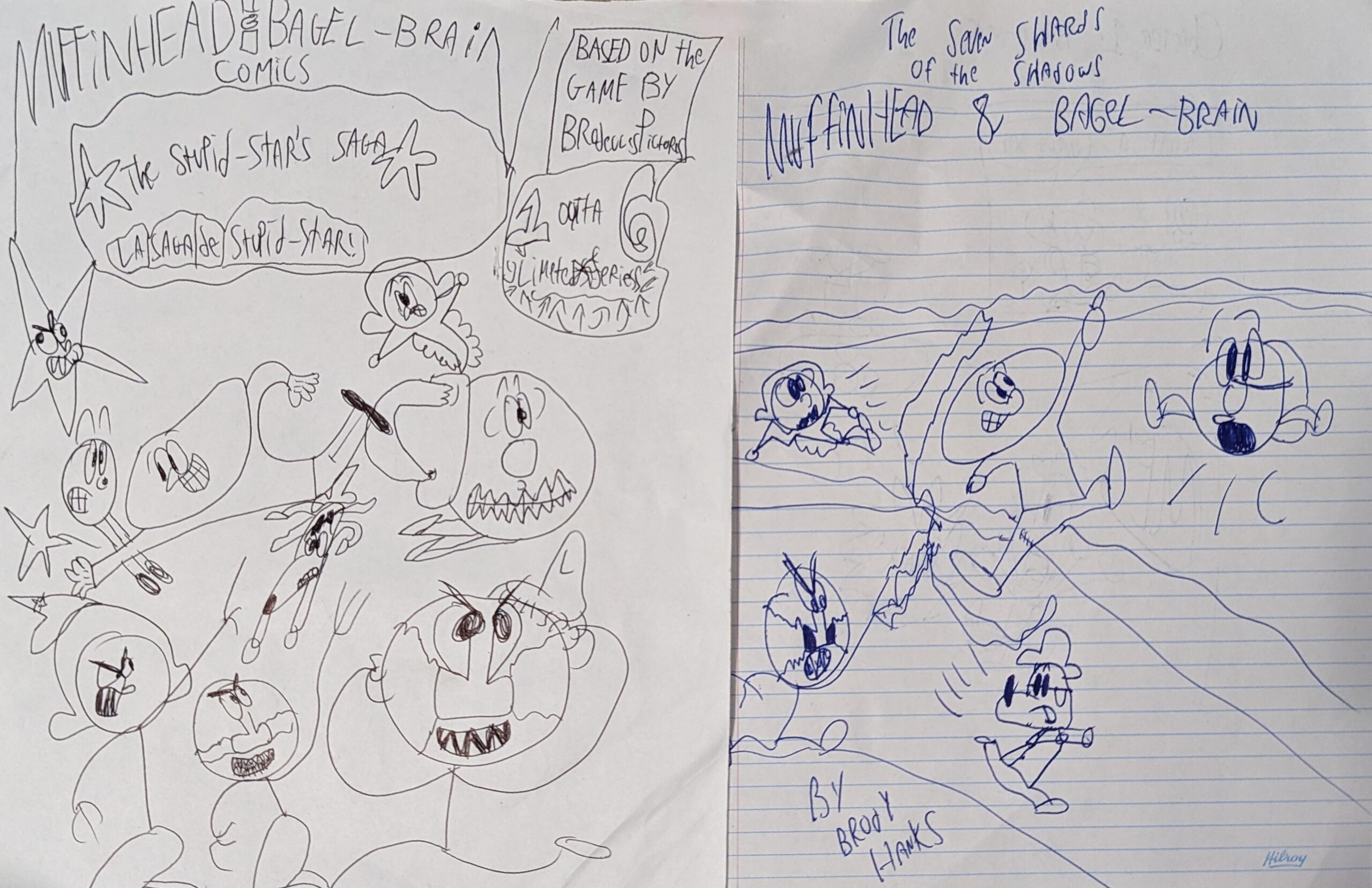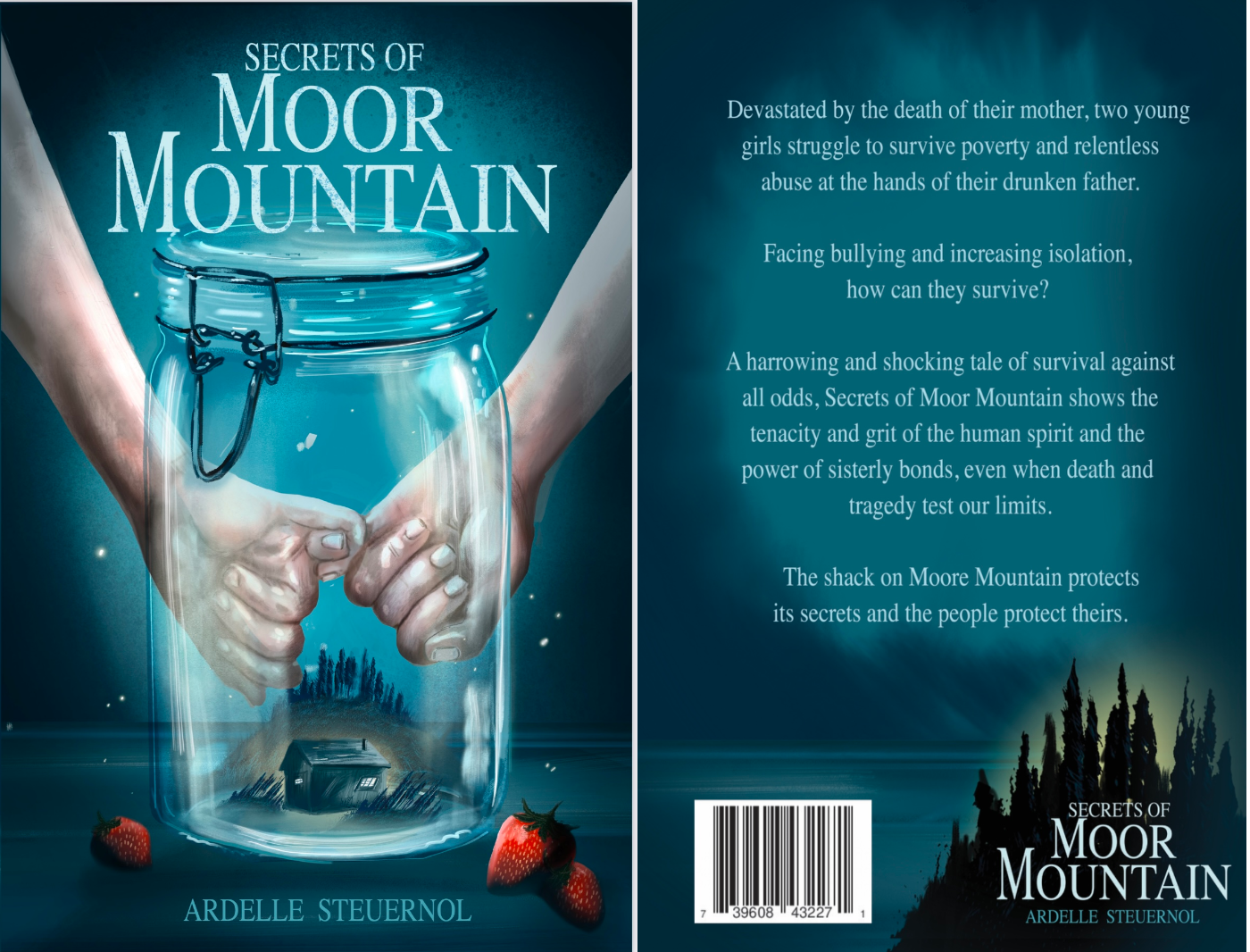The winners of Burlington Public Library’s Write Here. Write Now. contest wrote poems, short stories, and comics, on topics like identity, home, friendship, speaking up, and finding one’s own strength, featuring characters like a woman trapped in a painting, a dog walker, an elephant — and a man with a muffin for a head.
This annual contest attracted entries from 197 Burlington writers; entrants ranged in age from 10 to 93 years old. The panel of Burlington Public Library (BPL) staff who had to choose winners had a tough job — so tough that an extra winner had to be chosen in the short story category for writers 18 and over. The three categories (poetry, short stories, and comics) each had three age groups: 10–12, 13–17, and 18+.
We had the opportunity to speak to some of the winners in each category, to find out about their inspiration and hear more about their winning work. There are also winning works to explore by Griffin Dekker, Avery Parkes, Jennifer Filipowicz, and Ali Thompson.
Winners in the 10 to 12 category: Kayla and Brody
While the actual content of the writing by Kayla Gareau, winner in the 10–12 poetry category, and Brody Hanks, winner in the 10–12 comic category, is very different, they share a love of writing — so much so that both would like their future careers to involve writing, Kayla as an author, and Brody as an author/illustrator.
Kayla, who will be going into grade 8 in September, writes short stories as well, and says that her ideas often come to her as she is walking home from the bus after school. “The words started flowing into my ears, then I got in the house, and started writing down the words…it just started to happen.”
Alongside writing (“Whatever ideas I have, I turn them into stories,” Kayla notes), Kayla loves reading and dancing. She calls herself “a book nerd,” reading far and wide, including “how-to” books, “because you learn stuff you wouldn’t learn in everyday life.”
Brody, on the other hand, has been working on a series of books featuring his main characters, Muffinhead and Bagel-Brain, “for a long time — at least a year or two.” His winning comic entry, Muffinhead and Bagel-Brain, is just one from his series, and marked the first time he had typed the words for his hand-drawn comics; usually, he writes the words by hand as well (though, he says, he’s not a big fan of colouring his comics in — he prefers black and white comics).
Much thought has been put into the characters and world of Muffinhead, who is a bit of an anti-hero. Muffinhead himself came to life after Brody, who will soon be in grade 6, began thinking about the word “muffinhead” as a mean name you could call someone for being bad at doing something, and how he could “make that character into a reality where it’s an idiot with a big ego.” Then there’s Torto, who is “opposite [to Muffinhead] in that he’s trying to do good,” but gets angry with Muffinhead’s antics easily. There’s also Squarey the Square; Sally; Torto’s sister, Turto (the cupcake queen who rules over Muffinhead’s homeland of Cupcake Kingdom); Longeoe, the villain of the story; and Bagel-Brain, who features prominently in Brody’s winning entry.

Though he’s been working on Muffinhead comics for a long time, the ideas are not all set out in advance. Rather, Brody says, the ideas come to him as he’s writing, so he doesn’t know when he starts writing how things will play out. Brody’s mom, Brenda, notes that he has been raiding the house for paper to staple together to turn into books before he could even write, which he’d then fill with characters and “scribbly writing.” Brody’s creativity and world-building clearly started early. Despite his early start on creating comics, when his dad told him that he’d won his age category in the Write Here. Write Now. contest, Brody didn’t believe it was real at first. (He was later sorry for doubting his dad, he says.) Then, the emotions came in: “99.99999% confusion…then that last [little bit]…happy, weirded out, and awkward,” describes Brody.
Alongside making comics and reading (favourites include the Big Nate series, Dog Man, Diary of a Wimpy Kid, and Catwad) Brody creates video games, including a Super Mario parody that was the inspiration for Muffinhead, and his series of Nightshift at the Museum Floor games, which, he notes, are his most popular games on Scratch (a platform for video game making and playing) and amongst his classmates from last year. And Brody is also looking forward to having a YouTube channel of his own — when he’s old enough. No doubt it will be full of jokes when it starts, just like his comics.
Winner in the 13 to 17 category: Mia
Next up was Mia Greene, the winner of the short story category for entrants aged 13 to 17 years old. Going into grade 10 this year, Mia already describes writing as one of her passions, something she’d like to continue to do in her future career. She writes fiction, short stories as well as longer projects, and has entered a number of contests already. When she saw the BPL context, she knew she would enter, but wanted to write “something very unique and different.” Mia turned to Pinterest for inspiration, as she often does. While scrolling, she came across photos of paintings: inspiration struck. Mia came up with the idea of a woman trapped in a painting, and “it fell into place from there,” she says.
The woman in the painting yearns to be free, and her painter is set up as the villain. But really, Mia explains, he is a “representation of the way we stop ourselves from achieving what we want…we get in our own way.” The woman in the painting is “so attached to the idea that it’s his fault, it’s what he did, but she really just needs to realize her own strengths to escape.”
And where did the title, Nefelibata, come from? Another Pinterest session gave Mia pages with interesting words and their meanings, and she came across the Portuguese word nefelibata, which means “cloud walker,” someone who “lives life on their own terms.” As whether the woman in the painting makes it out of her frame? You’ll have to read the story to find out.
Winners in the 18+ categories: Denny, Greg, and Dominique
Denny Williams, the winner of the 18+ poetry category, had never written poetry before writing Reflections on Pet Ownership, though he does write and appreciate other forms of writing: prose, limericks, songs, and wordsmithing in general. Denny credits a friend in western South Dakota with keeping his thinking sharp, as they trade funny bits of writing back and forth.
A big fan of the library (“It’s been a godsend during the pandemic…I read every single Agatha Christie e-book they have over the course of the two years,” he says), Denny is another winner for whom inspiration struck quickly. He found out about the contest from BPL’s newsletter, and soon after, he says, the poem just “came to me. I jotted it down and sent it in without even contemplating too much.”
As I walk my collie thru snow gently falling,
Reflections on Pet Ownership by Denny Williams
I realize pet ownership is not my calling.
And good that he didn’t think it through too much, otherwise we might not get to read his ode to dog ownership — or rather, to not having dogs. Though Denny grew up with dogs and other animals — his grandparents had collies, his parents also had dogs, his grandmother had canaries and a parrot, and his aunt and uncle had a pet store — he never had any childhood pet-caring duties, none were ever “his” dog. And thus, though he’s had and loved Siamese cats as an adult, he has never wanted to have a dog, and indeed, “formed a thankfulness” that he doesn’t own one, as reflected in his poem. Denny notes that he dog-sat for a friend after submitting his poem, and the experience only served to reinforce those feelings. And if he ever wavers, he only has to look out his window in the early hours or when it’s pouring rain, and see people and their dogs trudging along to sort that out.
But the feeling of having his poem chosen as the winning entry is entirely different: was impressed by the talent of the other winners, “really creative stuff,” and so Denny felt “honoured that they selected me.” He says he’s pleased that the panel enjoyed it, “[And] if anyone relates to it…or if it gives someone a smile for that day…that’s super.”
For short story winner Greg Blount, winning came “as a huge surprise…it was thrilling to win,” so much so that it may encourage him to get back to writing a little more, after working more on guitar playing and music as of late.
Books and storytelling have long been important to Greg — after teaching music for three years in B.C., where he is from, Greg started and ran Minnow Books for 30 years, organizing book fairs in schools that included a storytelling element. It was then that Greg began trying his hand at writing his own short stories. He also gave workshops on story-writing and storytelling for a while for grade school classes.
Greg recalls one particular story that always got a reaction from the grade 6, 7, and 8 students, involving young love. A boy adores a girl, but doesn’t say anything about it. One day, she asks him to walk her home — and “he’s in heaven” until, that is, he finds out that she asked because it is “Opposite Day” at school. At this point, Greg says, the kids in the class would all shriek in dismay; once, a girl actually stood up and exclaimed “You can’t do that!” But all was fine in the end: turns out, the girl in the story really did like the boy, she just normally wouldn’t have had the nerve to ask him to walk her home.
His winning story, Cooper Falls, was inspired by friendship. In particular, the kind of friendship, which most of us have probably had as kids or even as adults, where your friend “kind of dominates you,” says Greg. “After awhile, you want to squirm out and show your worth or strength.” And so Cooper Falls was born. The writing process for Greg involves asking the question, “What happens next?” then thinking of the possibilities, choosing one, and asking again. It also involves considering the characters’ lines of thought — what are characters thinking that leads them to make their choices? What is “the true way the story should end?” Those natural or good endings to stories, Greg says, happen “if you’re lucky. I feel very fortunate when one of those little gems drops into my head — but it isn’t frequent!”
Though Greg’s stories are all very different, they often, like Cooper Falls, involve humour. “I like the way humour can give you a little break from life,” Greg explains, and hopes people get a laugh out of his story. However, he doesn’t write regularly now; he went back to music, as music is something you can do with other people and for other people. Writing is done alone, and usually “maybe a few friends [will] read it.” But after this contest win, Greg may get back to writing: “if someone else is saying you did something good, what more could you want?”
Last but certainly not least, we spoke to Dominique Bowler-Brown about her comic, Elephant Bones. Dominique set about this project by thinking about children’s stories. Specifically, about the kind of children’s story that she wanted to read to her kids. She says, “Many are fluffy and happy…[but] I think my kids are capable of thinking of deeper, wider things.”

And, though Dominique has been writing for her whole life, everything from novels and short stories to screenplays, she has been home-educating her kids for the last three or four years: she wanted to come out of mum-mode. (No, “mum” is not a misspelling here; Dominique and her family have only recently moved to Burlington from England.) Her children are currently 9 and 6 years old, and so Dominique considered the kinds of subjects they are figuring out right now, like who they are, and the question of where they can be “home.”
Dominique first had the idea of a monument, a museum exhibit, coming to life and discovering who he is and then wanting to go home. She quickly realized that it would work well as a comic. Then came the question: “Can I make a comic? I’m terrible at drawing!” (Spoiler alert: she can and she’s not.)
The story developed: Dominique, who describes herself as “obsessed with elephants” after a honeymoon visit to a Sri Lankan elephant sanctuary, wanted to pay homage to the relationships the sanctuary elephants had with their human carers. The back story in Dominique’s mind was that the elephant was taken from his home to perform in the circus, and in his life-after-life, the elephant thinks, “If they’re going to build a monument to me, it’s this relationship, rather than anything else,” that should be paid tribute to: that beautiful, cross-species, peaceful and caring love, where he felt most at home and most himself.
Much of Dominique’s writing has been about finding a voice, as a Black Caribbean — and autistic — woman, and feeling like others won’t “get it”; she even had a professor at Goldsmiths, University of London, tell her, “No one’s going to understand you, you don’t have an audience.”
When Dominique found out she won, her daughters were thrilled. To Dominique, having her girls see that others understood her writing, was powerful, particularly from the point of view of her older daughter, who also has Asperger’s syndrome. “Seeing me being understood, my oldest feels like she can be understood [now].” Dominique is also touched that her girls like her comic; they’ve been asking to read it at bedtime. Her mission of telling her kids a thoughtful and non-preachy story with a big message? Decidedly accomplished.
And that glow on the man’s hand when elephant and man are finally reunited? That feeling of finding home and being at home has been on all their minds since coming to Burlington — and the family has found home in Burlington. That was inspired by “the glow of community” that Dominique and her girls feel from their Burlington community. Dominique describes meeting neighbours and a home-education group through her family’s church, people “who are wonderful to me and my kids, and made me feel more at home than I felt in England.”
All winning entries can be found here, and are definitely worth a read — not only to appreciate Burlington’s talent, but also for your health: Kayla passed on this fun fact when we spoke: “If you’re a book reader like I am…it can improve your health and mental health and you can actually live longer.” Double the reason, then, to dive into the Write Here. Write Now. submissions and that book you’ve been meaning to read for ages!




